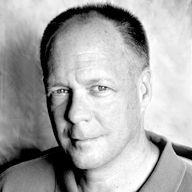David Baker

David Baker was born in 1954 in Maine and grew up in Missouri. He received degrees from Central Missouri State University and University of Utah and has taught at Kenyon College, Ohio State University, and the University of Michigan. Currently he holds the Thomas Fordham Chair of Poetry at Denison University, in Granville, Ohio, and serves as Poetry Editor of The Kenyon Review. He teaches also in Warren Wilson's MFA program. Baker's twelve books include Never-Ending Birds, (poems, Norton, 2009), Radiant Lyre: Essays on Lyric Poetry (2007, Graywolf), and Midwest Eclogue (poems, 2005, Norton). Baker has received honors from the Guggenheim Foundation, National Endowment for the Arts, Poetry Society of America, Society of Midland Authors, and others.
Never-Ending Birds
That's us pointing to the clouds. Those are clouds
of birds, now we see, one whole cloud of birds.
There we are, pointing out the car windows.
October. Gray-blue-white olio of birds.
Never-ending birds, you called the first time—
years we say it, the three of us, any
two of us, one of those just endearments.
Apt clarities. Kiss on the lips of hope.
I have another house. Now you have two.
That's us pointing with our delible whorls
into the faraway, the true-born blue-
white unfeathering cloud of another year.
Another sheet of their never ending.
There's your mother wetting back your wild curl.
I'm your father. That's us three, pointing up.
Dear girl. They will not—it's we who do—end.
“Never-Ending Birds” first published in The New Yorker magazine June 4, 2007
The Truth about Small Towns
1. THE TRUTH ABOUT SMALL TOWNS
It never stops raining. The water tower's tarnished
as cutlery left damp in the widower's hutch.
If you walk slow (but don't stop), you're not from nearby.
All you can eat for a buck at the diner is
cream gravy on sourdough, blood sausage, and coffee.
Never lie. The preacher before this one dropped bombs
in the war and walked with a limp at parade time.
Until it burned, the old depot was a disco.
A cafe. A card shoppe. A parts place for combines.
Randy + Rhonda shows up each spring on the bridge.
If you walk fast you did it. Nothing's more lonesome
than money. (Who says shoppe?) It never rains.
2. GRAVEYARD
Heat in the short field and dust scuffed up, glare
off the guard-tower glass where the three pickets
lean on their guns. The score is one to one.
Everybody's nervous but the inmates,
who joke around—they jostle, they hassle
the team of boys in trouble and their dads.
It's all in sport. The warden is the ump.
The flat bleachers are dotted with guards; no
one can recall the last time they got one
over the wall. The cons play hard, then lose.
And the warden springs for drinks all around—
something he calls graveyard, which is five kinds
of soda pop poured over ice into
each one's cup, until the cup overflows.
3. COUNCIL MEETING
The latest uproar: to allow Wendy's
to build another fast-food burger shack
on two acres of wetlands near Raccoon Creek,
or to permit the conservationist
well-to-do citizenry to keep their green
space and thus assure long, unsullied views
from their redwood decks, picture windows,
and backyards chemically rich as golf greens.
The paper's rife with spats, accusations,
pieties both ways. Wendy's promises
flowers, jobs. The citizens want this, too,
but want it five miles away where people
don't care about egrets, willows, good views.
Oh, it's going to be a long night: call
out for pizza, somebody brew some tea.
Then we'll all stand up for what we believe.
4. CHARMING
The remnant industry of a dying town's itself.
Faux charm, flaked paint, innuendo in a nasal twang.
Now the hardware store's got how-to kits to make
mushrooms out of plywood for the yard,
and the corner grocery's specialty this week
is mango chutney, good with rabbit, duck, or spread
for breakfast on a whole-wheat bagel fresh
each morning at the small patisserie across
the way from the red hotel. Which reminds me.
Legend has it that the five chipped divots
in the hotel wall—local lime and mortar—
are what remains of the town's last bad man.
His fiery death's renowned, but don't look now
Someone with a camera's drawing down on you.
“The Truth about Small Towns” from The Truth About Small Towns. 1998. University of Arkansas Press.

